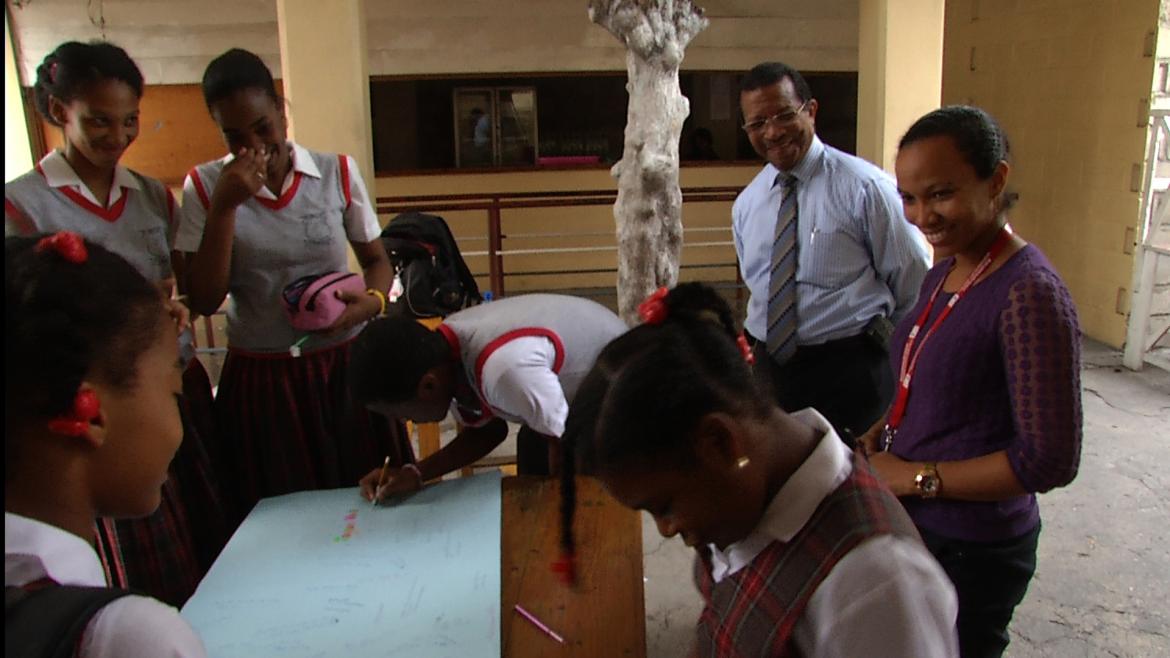I studied to be a civil engineer, but eventually my life path brought me here, as headmaster of College Catts Pressoir in Port-au-Prince.
I am using my skills in math and chemistry to teach by educational modeling.
Students are actors of development and hope
I love the challenge of “picking” from the internal reserves of every child, every young person, the potentialities that have been sleeping there, and help them grow, because each of them has to become self-sufficient. Students need to learn how to live in harmony with others and with nature. Whatever their differences in socio-economic class, religion or ideology, each can be a powerful actor of development.
I am happy to be continuously creating and learning strategies that allow students to develop self-confidence, to feel the desire to learn and the duty to build together a world that has a solid foundation, despite the obstacles that appear every day in our societies.
Science, technology and math are key skills
Today we live in a very fast world! Our society is changing every day, every minute, every second. We move from “NTIC” to “NBIC” (nano technology to biotechnology).
But these incredible scientific and technological discoveries also dig a wide gap between the rich, the middle class and the poor. The inequality of economic resources too often penalizes young brains, even if they have the same capabilities as others.
Educational systems must adapt to offer the same opportunities to succeed to all.
Science, technology, engineering and math (STEM) is a big part of what students need to learn to get a chance at that success.
Teaching mathematics is helpful for many other skills, such as implementing mathematical logic, analytical reading of texts, arguing, validating and correcting an approach, mathematical modeling, organization and data management, project management, personal and collective finance, entrepreneurial development…
Teaching sciences and technology can help with creativity, development of a scientific culture, analytical research, logical suites (observation, questioning, experimentation, argumentation, production, practical achievements, concrete evaluation). It can also have an impact on society, through for example the protection of the environment.
Finding ways to bring everyone along
Sometimes STEM are considered “difficult” subjects. But that’s when the teaching strategies need to be adjusted so that we democratize access to these subjects and give everyone an equal opportunity to innovate. Educational modeling makes difficult subjects much easier to understand.
Core of my teaching strategy is using science and technology in the service of society. I always push my students to drive the process. Students apply their learning to explore and develop models of community development.
I encourage student teamwork to build and implement these models. Students apply what they learn in class to address critical needs in their community.
Knowledge is a means, not the end. As students take an active role in their community, they learn from early age the necessary skills of teamwork, creativity, and self-confidence to lead positive change throughout their adult life.
At the end of each year, students present their projects in a Science Fair, which is open to the public. These projects represent their final exams in math, science and technology. With this strategy, teachers become guides for students and students become change makers!
This is the third in a series of 4 blogs by teachers selected as finalists for the 2015 Global Teacher Prize. Read the other blogs from Kenya by Jacque Jumbe-Kahure and from Cambodia by Phalla Neang
